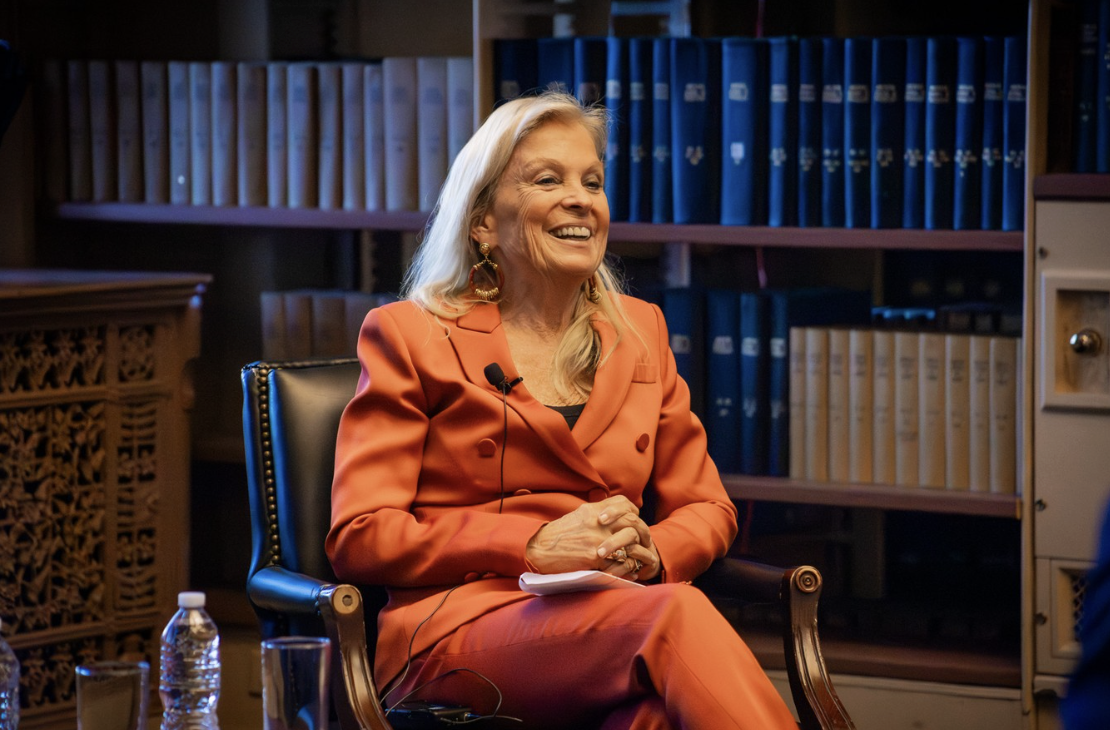Georgetown University administrators divulged plans to mitigate the impacts of federal cuts to academic research funding through growing enrollment in master’s programs and seeking alternative funding at a March 13 town hall for Main Campus faculty and staff.
Georgetown convened a Federal Impact Working Group to lead the university’s response to executive orders impacting education and research following the Trump administration’s mass layoffs at agencies administering research grants and plans to cap the rate of indirect costs (IDC), which include all overhead expenses, at 15% for National Institutes of Health (NIH) grants. The working group — which includes staff from the university’s Joint Office of Research Administration (JORA), an organization providing administrative support to faculty receiving external research funding — is seeking to preserve existing activities and funding while complying with new policies.

Alyscia Eisen (GRD ’23), vice president and chief business officer for Georgetown’s Main Campus, said the executive orders will likely affect the College of Arts & Sciences (CAS) the most.
“As we look across the tapestry of our own campus, the major impacts for us will be in the College, and that’s something we’re working very closely with the College dean and the College chairs to monitor and make sure that we’re able to mitigate any impacts of these final decisions on their operating budget,” Eisen said at the meeting.
“It’s not insignificant for our university, but it is in the realm of what we’re able to measure and begin to create mitigation plans around, and we’re working very closely across the different schools to do that and develop our strategies for managing if these reductions in total volume and IDC happen for next year,” Eisen added.
For fiscal year 2024, the Main Campus received $22.1 million in revenue from federal grants and contracts and $7.3 million of funding categorized as IDC, according to slides at the town hall. The College, which includes the biology, chemistry, physics and psychology departments, accepted $13.2 million of federal funding and $5.0 million of IDC.
The funding, separate from federal allocations of student financial aid, supports faculty research across disciplines, including several post-doctoral scholars and researchers. Expenditures classified as IDC include administrative services provided by JORA, facilities management, utilities, environmental and health compliance and library services.
Jeff Urbach, vice provost for research and the working group’s co-chair, said the implications of the executive orders targeting research funding remain uncertain.
“There’s, unfortunately, quite a bit more on our radar screen,” Urbach said at the town hall. “Additional terminations are expected, based on what we’re hearing, at the Department of Education.”
“Many federal agencies are facing severe staffing shortages as a result of the actions of the administration, and that will likely impact their ability to review awards and process new grants,” Urbach added.
According to Urbach, the university seeks to mitigate the impact of cuts to research funding by diversifying funding sources, including through private grants and additional philanthropy. Urbach said that, though Georgetown is not implementing layoffs or a hiring freeze, some post-doctoral scholars and federally-funded researchers might face difficulty if their funding is rescinded.
Eisen also said Georgetown hopes to make up for lost revenue by growing its master’s student population by offering a 10% tuition discount for current undergraduate seniors and recent graduates to enroll in master’s programs. The university is also launching a similar program for displaced federal workers.
Urbach said even as several agencies, including the NIH and the National Science Foundation (NSF), are now operating with a reduced workforce, subsequent lawsuits have found the agencies are still responsible for financing research.
“Courts have highlighted that the agencies have an obligation to continue funding support and finding a reasonable approach to this,” Urbach said. “In other words, they are obliged to try to continue to find ways to do what they’re obliged to do, and so that it often takes us some time to understand what is really going to happen.”
A March 6 preliminary injunction issued by the District Court of the District of Rhode Island prevents the Office of Management and Budget (OMB), which oversees the federal government’s compliance with budget policies, from declining to issue funds to organizations receiving grants both directly and indirectly.
Trump signed several executive orders restricting educational institutions from receiving federal funds if they provide diversity, equity and inclusion (DEI) programming. Ed Martin, the interim U.S. Attorney for Washington, D.C. sent a March 7 letter to Georgetown University Law Center Dean Bill Treanor stating that his office would not hire Georgetown Law graduates unless the school removed DEI teachings from its curriculum.
Soyica Diggs Colbert (COL ’01), Georgetown’s interim provost, said an internal audit found the university’s diversity, equity and inclusion (DEI) programming is within the bounds of restrictions applied by the federal government.
“One of our university principles is community in diversity, and so we have done an audit of all of our activities as they pertain to DEI to make sure that they are in compliance with the current guidance from the federal government, and we will continue to engage in that activity to understand how we are in alignment with what the federal government is asking,” Colbert said at the meeting. “But in terms of our commitment and our ongoing work, the work goes on, and we will figure out how to achieve our goals within the new constraints of the federal government.”
Katy Button (SFS ’94), the university’s associate vice president for federal relations, said Georgetown’s location makes it difficult for the university to make its voice heard.
“This is not a great time to be in D.C., without a real congressional delegation and, as you’ve probably read in the news, the really dramatic financial hit that D.C. is taking,” Button said at the meeting. “But we do have a very large and supportive alumni network on the Hill.”
“They’re doing whatever they can,” Button added.
Casey Inge, a university counsel leading research regulatory compliance efforts, said the executive orders’ impacts remain unclear as litigation against the initiatives continues.
“This is an evolving situation, particularly since we have seen a number of court cases challenging the executive orders and, through those court cases, we’ve seen a number of instances where there have been preliminary injunctions — temporary, receiving orders first — but now preliminary injunctions relevant to us and from which we are benefiting,” Inge said at the meeting. “For example, these preliminary injunctions coming from the litigation have provided some limited protection with respect to funding freezes, stop work orders and terminations.”
Urbach and Inge both urged Georgetown researchers to consult with JORA before responding to any inquiries or stop work orders from federal agencies.
Button said she understands the tension and unease resulting from these unprecedented changes in the federal government.
“I think it’s just a fraught time for everyone emotionally,” Button said. “I know people on this call probably have spouses or other family members who may have lost a job. I know in my neighborhood, someone on every block has been impacted. I want to serve as a resource, to do everything I can to support you all in your work, but also understand that it’s just a really difficult, unprecedented time to be doing the work we do and living in the city that we live in.”







